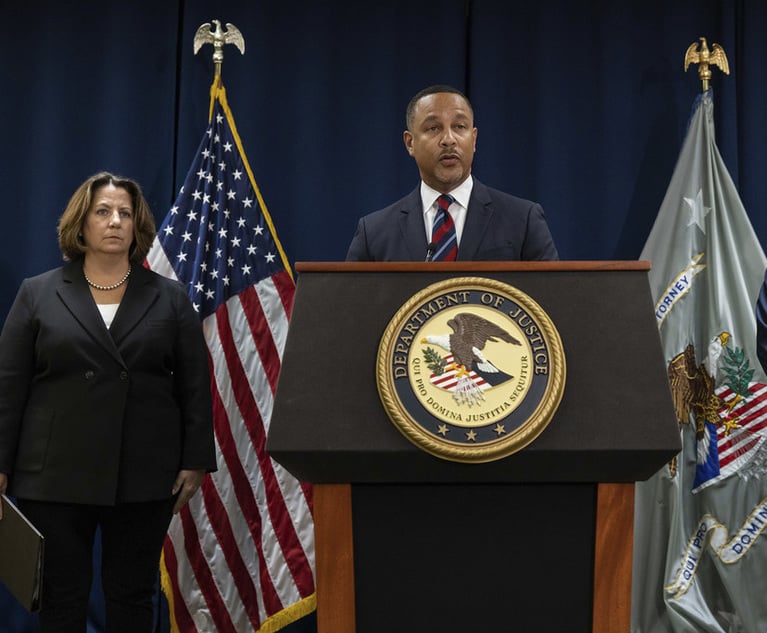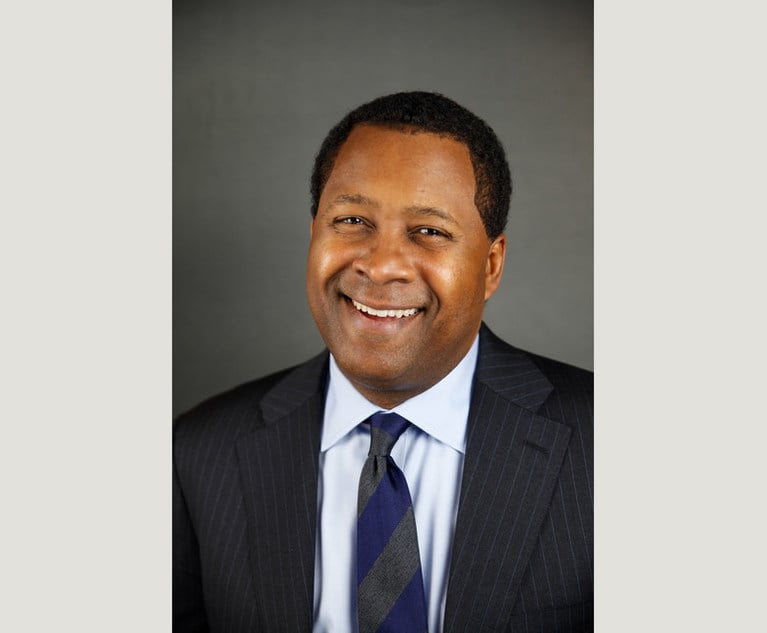Compliance Hot Spots: 'Suspicious Activity Reports' at SCOTUS | Cooley's Big New Hire | DOJ Closes Uber Probe | FTC Goes Solo at High Court | Who Got the Work
Welcome to Compliance Hot Spots, our white-collar and regulatory Law.com briefing. Scroll down for a report on new U.S. Supreme Court action between an investment advisor and Fidelity. Plus: the FTC's going solo at the high court, and DOJ's closed its Uber probe. Thanks for reading!
January 07, 2020 at 09:00 PM
9 minute read
Welcome to Compliance Hot Spots, where we're chronicling white-collar regulatory and enforcement news and trends. We've got a report below on some U.S. Supreme Court action involving "suspicious activity reports," and scroll down for headlines, Who Got the Work and notable moves. Did you see who Cooley picked up from the Mueller prosecution team?
Tips, feedback and general thoughts on your practices are always appreciated. Contact C. Ryan Barber at [email protected] and 202-828-0315, or follow him on Twitter @cryanbarber.

At Supreme Court, Fidelity Argues Against Liability Over 'Suspicious Activity Report'
Lawyers for the investment services provider Fidelity Brokerage Services LLC this week asked the U.S. Supreme Court to keep in place a federal appeals court ruling that said the company could not be held liable in a private lawsuit for merely telling U.S. financial regulators about an allegedly suspicious stock transaction.
Fidelity, represented by the law firm Jones Day, is vying to leave undisturbed an April 2019 decision from the U.S. Court of Appeals for the First Circuit. A provision of the federal Bank Secrecy Act accords immunity to financial institutions that make voluntary and confidential disclosures called "suspicious activity reports." These submissions, widely known by their acronym SARs, help federal authorities investigate potential financial misconduct.
The Jones Day team, led by partner Shay Dvoretzky, is contesting a Supreme Court petition filed in September by AER Advisors Inc. and two of its clients, William J. Deutsch, who is chairman of Deutsch Family Wine & Spirits, and his son Peter Deutsch, who serves as the company's chief executive officer. The Deutsches and AER Advisors are represented by Howard Graff, an Arent Fox counsel in New York.
"Petitioners brought this action against Fidelity seeking redress for Fidelity's fraudulent concealment of its own conduct, a cover-up of its illicit lending practices and market manipulation that created a short squeeze," Graff said in the petition. He argued it was Fidelity's transaction conduct, and nothing that AER and the Deutsches did, that caused a "market disruption" in shares of a company called China Medical Technologies Inc.
The history of the Bank Secrecy Act, Dvoretzky told the Supreme Court, "as well as policy considerations, all confirm that the court below reached the right decision. Financial institutions are absolutely immune from private suits that are based on the filing of a suspicious activity report."
Fidelity's lawyers also argued that AER and the Deutsches would face a particular challenge trying to prove their case. Federal law prohibits financial institutions from revealing suspicious activity reports.
"Petitioners do not have the alleged report or know its contents," Dvoretzky wrote in Fidelity's new filing. "And the Bank Secrecy Act forbids Fidelity from revealing the contents of any suspicious activity report, or even whether a report exists. So petitioners could never prove that a suspicious activity report was even filed, much less that the filing was in some respect improper." —Mike Scarcella

Who Got the Work
 >> Melissa Laurenza, (at left)a partner at Akin Gump Strauss Hauer & Feld, advised the National Council of Resistance of Iran in connection with a recent disclosure about the group's political activities in the U.S. In that filing, made under a federal law requiring the disclosure of foreign lobbying in the U.S., the National Council of Resistance of Iran withheld the names of people affiliated with the group, citing fears that the Iranian regime would execute or otherwise punish members of the movement. Laurenza (at left) said information about the identities of those working with the National Council of Resistance of Iran would be available for Justice Department officials to review at Akin Gump's office.
>> Melissa Laurenza, (at left)a partner at Akin Gump Strauss Hauer & Feld, advised the National Council of Resistance of Iran in connection with a recent disclosure about the group's political activities in the U.S. In that filing, made under a federal law requiring the disclosure of foreign lobbying in the U.S., the National Council of Resistance of Iran withheld the names of people affiliated with the group, citing fears that the Iranian regime would execute or otherwise punish members of the movement. Laurenza (at left) said information about the identities of those working with the National Council of Resistance of Iran would be available for Justice Department officials to review at Akin Gump's office.
>> Axon Enterprise Inc., represented by a team from Orrick, Herrington & Sutcliffe, and in-house lawyers—"sued the U.S. Federal Trade Commission in a bid to have potential antitrust litigation heard in a federal district court and not in an internal FTC process that it alleges is biased toward regulators," Reuters reports. Read the complaint here.
>> Robert Cleary at Proskauer Rose was counsel to Longfin Corp. CEO Venkata S. Meenavalli, who recently agreed to pay $400,000 in disgorgement and penalties to resolve a U.S. Securities and Exchange Commission fraud case. The settlement is subject to court approval.
>> A team from Cleary, Gottlieb, Steen & Hamilton is defending Post Holdings' proposed $110 million acquisition of TreeHouse Foods' cereal business against a challenge from the Federal Trade Commission. The FTC has scheduled an administrative trial over the deal for late May and, in the meantime, is pressing for a court order blocking the companies from consummating the deal. U.S. District Judge Richard Leon held an initial hearing Monday in Washington federal court, where TreeHouse Foods was represented by McDermott Will & Emery partner Ray Jacobsen.

Compliance Corner: What We're Reading
Federal agencies
FTC Files Own Petition, Suggesting Divide in Federal Government. "Between 1975 and November of 2019, [the FTC] had represented itself before the court only four times. In December of 2019, it did so for the fifth time, asking the justices to review a ruling by the U.S. Court of Appeals for the 7th Circuit that, according to the agency, 'threatens the FTC's ability to carry out its mission by eliminating one of its most important and effective enforcement tools.'" [SCOTUSblog]
Justice Department Closes Uber Bribery Probe. "The Uber investigation, which was previously reported by The Wall Street Journal in 2017 and disclosed by the ride-hailing company in April, focused on allegations of improper payments in Indonesia, Malaysia, China and India. The company disclosed the end of the probe in a securities filing Monday, saying the Justice Department would be taking no action." [WSJ] Law.com has more here.
DOJ Pursues Drug Suit That Got Away to Shore Up Dismissal Power. "Companies that bill the federal government for services are eager in 2020 to see what courts say about Justice Department decisions to dismiss whistleblower cases it finds to be meritless or a burden on government resources." [Bloomberg Law]
Market Regulator Heads Back to Court Against Kraft and Mondelez. "The country's primary regulator of derivatives markets is clashing in court again with some of the nation's biggest food companies, in a case that could reveal the extent of the government's power to go after market manipulation." [WSJ]
Courts and cases
Cognizant Technology Sied for Legal Fees by Indicted Ex-Lawyer. "Cognizant Technology Solutions Corp. was sued in Delaware by its former top lawyer, who claims the tech company isn't paying all the legal fees he's racked up since being indicted by the Department of Justice and sued by the Securities and Exchange Commission." [Bloomberg Law] More here at Law.com.
Exxon Wins Rare Reprieve From U.S. Sanctions Fine. "Exxon Mobil Corp. won't have to pay a fine for continuing to do business with a Russian state-run oil company amid increasing U.S. sanctions on the country, a federal judge ruled. U.S. District Judge Jane Boyle's ruling this week voids a $2 million fine the U.S. Treasury Department imposed on the Irving, Texas-based oil giant in July 2018 for allegedly violating U.S. sanctions on Russia when it entered into contracts with Russian oil firm PAO Rosneft." [WSJ]
Compliance culture
Advice to General Counsel for 2020: Get Your Compliance House in Order. One of the most important moves general counsel can make to protect their companies is to add depth to their compliance programs, according to Pamela Davis, a white-collar crime and regulatory defense partner at Winston & Strawn in San Francisco. [Corporate Counsel]

Notable Moves and Announcements
 >> Cooley has hired Elizabeth Prelogar (at left), a former Justice Department appellate lawyer who was detailed to Special Counsel Robert Mueller's office, "with a goal of building a Supreme Court practice as well as tackling white-collar, technology, privacy and government investigation matters," my colleague Tony Mauro reports. Why did Prelogar pick Cooley, when she could have taken her pick of firms that specialize in Supreme Court practice? Andrew Goldstein, a colleague in the Mueller investigation who previously worked as a federal prosecutor and joined Cooley in June, was instrumental in recruiting her.
>> Cooley has hired Elizabeth Prelogar (at left), a former Justice Department appellate lawyer who was detailed to Special Counsel Robert Mueller's office, "with a goal of building a Supreme Court practice as well as tackling white-collar, technology, privacy and government investigation matters," my colleague Tony Mauro reports. Why did Prelogar pick Cooley, when she could have taken her pick of firms that specialize in Supreme Court practice? Andrew Goldstein, a colleague in the Mueller investigation who previously worked as a federal prosecutor and joined Cooley in June, was instrumental in recruiting her.
>> Curtis J. Mahoney, a top trade official in the Trump administration, and former Williams & Connolly partner, is poised to be the next legal adviser at the U.S. State Department. President Trump last week announced his intent to nominate Mahoney. Marik String, a former Wilmer Hale associate, has served as acting legal adviser since the departure of Jennifer Newstead, the last Senate-confirmed leader at State. Newstead, formerly at Davis Polk & Wardwell, is now general counsel to Facebook.
>> Blank Rome said Paul Tzur has joined the firm in Chicago as partner. Tzur formerly was deputy chief of the narcotics and money laundering section of the U.S. attorney's office for the Northern District of Illinois. Tzur clerked for Judge Steven Colloton at the U.S. Court of Appeals for the Eighth Circuit and later worked as a litigation attorney at Skadden, Arps, Slate, Meagher & Flom.
>> The real estate investment trust Ventas named Carey Shea Roberts as general counsel and ethics and compliance officer. Roberts succeeds T. Richard Riney, who recently retired. Roberts joins Ventas from Assurant Inc., where she had been chief legal officer. Roberts earlier was a partner at Covington & Burling.
This content has been archived. It is available through our partners, LexisNexis® and Bloomberg Law.
To view this content, please continue to their sites.
Not a Lexis Subscriber?
Subscribe Now
Not a Bloomberg Law Subscriber?
Subscribe Now
NOT FOR REPRINT
© 2025 ALM Global, LLC, All Rights Reserved. Request academic re-use from www.copyright.com. All other uses, submit a request to [email protected]. For more information visit Asset & Logo Licensing.
You Might Like
View All
Compliance Hot Spots: GOP Eyes ESG as an Antitrust Issue + Another DOJ Crypto Seizure + Sidley Partner Jumps to Main Justice
9 minute read
Compliance Hot Spots: Lessons from Lafarge + Fraud Section Chief Talks Compliance + Cravath Lands FTC Commissioner
11 minute readTrending Stories
- 1Arguing Class Actions: With Friends Like These...
- 2How Some Elite Law Firms Are Growing Equity Partner Ranks Faster Than Others
- 3Fried Frank Partner Leaves for Paul Hastings to Start Tech Transactions Practice
- 4Stradley Ronon Welcomes Insurance Team From Mintz
- 5Weil Adds Acting Director of SEC Enforcement, Continuing Government Hiring Streak
Who Got The Work
J. Brugh Lower of Gibbons has entered an appearance for industrial equipment supplier Devco Corporation in a pending trademark infringement lawsuit. The suit, accusing the defendant of selling knock-off Graco products, was filed Dec. 18 in New Jersey District Court by Rivkin Radler on behalf of Graco Inc. and Graco Minnesota. The case, assigned to U.S. District Judge Zahid N. Quraishi, is 3:24-cv-11294, Graco Inc. et al v. Devco Corporation.
Who Got The Work
Rebecca Maller-Stein and Kent A. Yalowitz of Arnold & Porter Kaye Scholer have entered their appearances for Hanaco Venture Capital and its executives, Lior Prosor and David Frankel, in a pending securities lawsuit. The action, filed on Dec. 24 in New York Southern District Court by Zell, Aron & Co. on behalf of Goldeneye Advisors, accuses the defendants of negligently and fraudulently managing the plaintiff's $1 million investment. The case, assigned to U.S. District Judge Vernon S. Broderick, is 1:24-cv-09918, Goldeneye Advisors, LLC v. Hanaco Venture Capital, Ltd. et al.
Who Got The Work
Attorneys from A&O Shearman has stepped in as defense counsel for Toronto-Dominion Bank and other defendants in a pending securities class action. The suit, filed Dec. 11 in New York Southern District Court by Bleichmar Fonti & Auld, accuses the defendants of concealing the bank's 'pervasive' deficiencies in regards to its compliance with the Bank Secrecy Act and the quality of its anti-money laundering controls. The case, assigned to U.S. District Judge Arun Subramanian, is 1:24-cv-09445, Gonzalez v. The Toronto-Dominion Bank et al.
Who Got The Work
Crown Castle International, a Pennsylvania company providing shared communications infrastructure, has turned to Luke D. Wolf of Gordon Rees Scully Mansukhani to fend off a pending breach-of-contract lawsuit. The court action, filed Nov. 25 in Michigan Eastern District Court by Hooper Hathaway PC on behalf of The Town Residences LLC, accuses Crown Castle of failing to transfer approximately $30,000 in utility payments from T-Mobile in breach of a roof-top lease and assignment agreement. The case, assigned to U.S. District Judge Susan K. Declercq, is 2:24-cv-13131, The Town Residences LLC v. T-Mobile US, Inc. et al.
Who Got The Work
Wilfred P. Coronato and Daniel M. Schwartz of McCarter & English have stepped in as defense counsel to Electrolux Home Products Inc. in a pending product liability lawsuit. The court action, filed Nov. 26 in New York Eastern District Court by Poulos Lopiccolo PC and Nagel Rice LLP on behalf of David Stern, alleges that the defendant's refrigerators’ drawers and shelving repeatedly break and fall apart within months after purchase. The case, assigned to U.S. District Judge Joan M. Azrack, is 2:24-cv-08204, Stern v. Electrolux Home Products, Inc.
Featured Firms
Law Offices of Gary Martin Hays & Associates, P.C.
(470) 294-1674
Law Offices of Mark E. Salomone
(857) 444-6468
Smith & Hassler
(713) 739-1250










